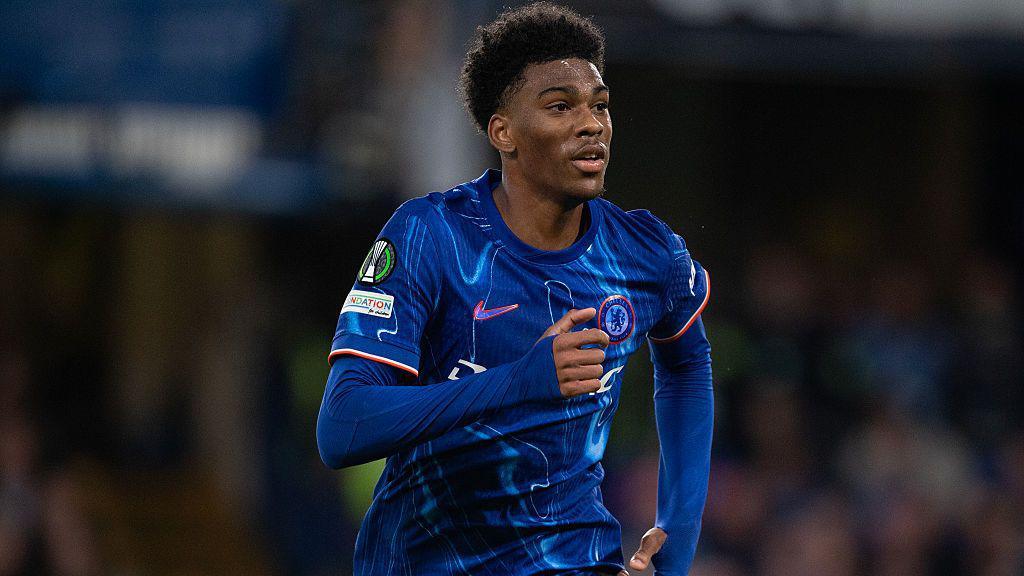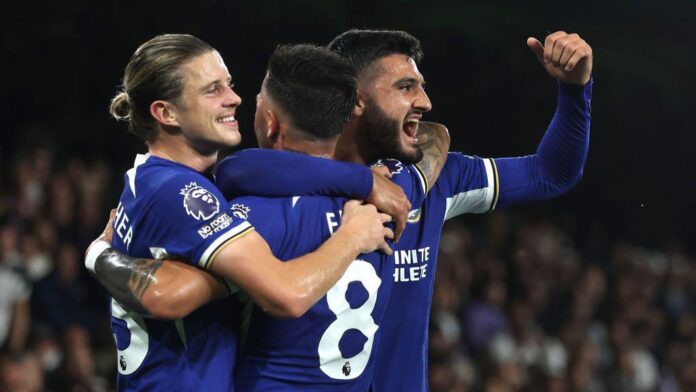Armando Broja’s move to Burnley means Chelsea have made more than £250m in sales on players from their academy in just three years.
Todd Boehly and Clearlake Capital, influenced by the pressure of the Premier League’s profit and sustainability rules (PSR), have accelerated a strategy that began under their predecessor as owner, Roman Abramovich.
In this case, Broja’s departure to Burnley is worth up to £20m if all add-ons are met, taking the potential total banked from academy player sales this summer to £41.2m.
Defender Bashir Humphreys also moved to Turf Moor for £14.7m, while Ishe Samuels-Smith moved to Strasbourg for £6.5m this summer.
Further sales are possible, with forward Tyrique George and England international Trevoh Chalobah not ruled out. Josh Acheampong has also attracted interest from Bournemouth but is considered not for sale unless a substantial offer is made.
The £41.2m slice of incoming funds is part of the £225.5m raised from player sales this summer alone.
But because academy players count as ‘pure profit’ in the club’s accounts, their departures have provided Chelsea with greater financial flexibility – helping fund £250m in new signings, with transfer fees amortised over the five-year span of long-term contracts.
Interestingly, Burnley have contributed over £55m to Chelsea through player purchases this summer, also signing midfielder Lesley Ugochukwu for a fee believed to be over £20m, despite being officially undisclosed.
Sales of Noni Madueke, Djordje Petrovic, and others have boosted Chelsea’s bottom line, with the club set to surpass £300m on incomings this summer.
The club are in talks to sign Manchester United’s Alejandro Garnacho, while RB Leipzig’s Xavi Simons remains a target ahead of the transfer deadline on 1 September.
What about the money from Mount and Gallagher?
Like all clubs, Chelsea are subject to a three-year monitoring period under Premier League and UEFA financial regulations. Conveniently for the current ownership, that period now fully covers the era under the US-led consortium.
Key sales of academy graduates: including Mason Mount (£55m to Manchester United), Ian Maatsen (£37.5m to Aston Villa), Conor Gallagher (£34m to Atletico Madrid), and Lewis Hall (£28m to Newcastle) have been crucial to Chelsea’s compliance with financial rules.
In total, the club has generated £251.2m from academy player sales over the past three seasons – a sum that, under PSR accounting, offsets as much as £1.25bn in spending on new signings.
However, even that has not been enough to keep Chelsea compliant with the rules without the sale of two hotels and the women’s team to a parent company for a combined £276.6m.
They were moves which satisfied the Premier League but were rejected by Uefa’s stricter financial rules.
As a result, Chelsea were fined £26.7m by Europe’s football governing body, a penalty that could rise to £51.2m if the club fails to align with its regulations in the coming seasons.
Even before the Boehly-Clearlake takeover in 2022, Chelsea had English football’s most profitable academy, with sales of players like Tammy Abraham, Marc Guehi, Fikayo Tomori, and Tino Livramento generating £163.5m between 2017 and 2022.
That revenue helped lay the groundwork for several record-breaking transfer windows under the new ownership.
Do Chelsea respect their academy enough?
Chelsea’s academy has undergone leadership changes in the past year, with Joe Shields and Glenn van der Kraan taking charge, while Jack Francis remains a key figure from the previous regime.
Although the departure of popular former leaders Neil Bath and Jim Fraser risked unsettling the academy, insiders say the new team has integrated smoothly into a structure already thriving at that level.
Meanwhile, head coach Enzo Maresca gave debuts to eight academy players last season but was no doubt influenced by Chelsea’s participation in the Conference League, a competition that saw them face a much lower level of opposition.
A more accurate measure of academy success is Premier League minutes played, where Levi Colwill, Reece James, and Chalobah remain flag bearers for the coaching staff at Cobham.
They were joined by Tyrique George and Josh Acheampong, both promoted to the first-team squad on a full-time basis.
All in all, Chelsea gave minutes to Colwill (3,149), James (1,063), Chalobah (911), George (178), Acheampong (169), Shim Mheuka (1), which totals 5,471 minutes played by academy players in the league last season.
Compared to their ‘big six’ rivals, that’s more than Manchester City, Tottenham and Arsenal, although the latter impacted by a serious injury to Bukayo Saka.
However, Manchester United and Liverpool provided more minutes to homegrown players or those at the club before their 21st birthday, per Uefa’s definition, which includes United’s Amad Diallo and Garnacho.
 Image source: Getty Images
Image source: Getty Images
Image caption: Josh Acheampong, now 19, first joined Chelsea at under-eight level
At the start of the current ownership, Chelsea led the big six in academy appearances but have since seen their numbers drop year-on-year to levels closer to their rivals.
Chelsea have faced criticism, including from their own fans, for selling academy talents – especially after the sale of Gallagher to Atletico last summer.
When asked about Gallagher’s departure in August 2024, Maresca said: “This is not Chelsea’s problem, these are the rules.
“All the clubs at this moment are compelled to sell players from the academy because of the rules. It’s all of the Premier League clubs’ problems.”
How does it compare to other clubs?
Chelsea lead the way in terms of player sales having made more than £100m more than any of the other traditional ‘big six’ since July 2022.
Tottenham’s total boosted by selling Harry Kane to Bayern Munich for an initial £86.4m in 2023.
- Chelsea – £251.2m in academy sales
- Manchester City – £148.5m
- Tottenham £123m
- Liverpool – £106m
- Arsenal – £97m
- Manchester United – £85.5m
Prior to 2022, Manchester City profited from selling the likes of Kelechi Iheanacho (£25m), Brahim Diaz (£15m), Douglas Luiz, Angus Gunn (£13.5m) and Jadon Sancho (£10m).



